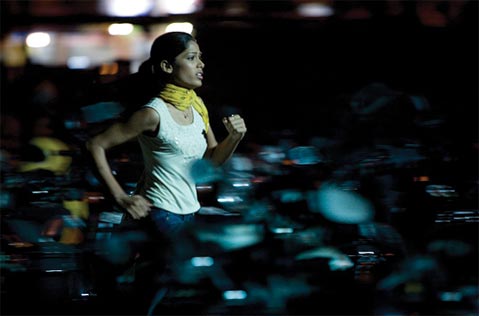Slumdog Millionaire
Dev Patel, Anil Kapoor, and Freida Pinto star in a film written by Simon Beaufoy, based on the novel by Vikas Swarup, and directed by Danny Boyle.

In his filmography, Danny Boyle has tended to go every which way but dull. He made art from druggy marginal urban grit in Trainspotting, summoned up one of the wittiest and tastiest “children’s films” with Millions, and scared the bejeezus out of us with 28 Days Later. Who is this guy Boyle, and why does he insist on foiling our attempts at labeling him?
In the clever, culturally layered, and mostly successful Slumdog Millionaire, Boyle turns yet another corner, combining elements of modern urban edginess, socio-cultural commentary, and lyrical melodrama. At the center of the inside-out narrative is the impoverished, intuitively bright, and deeply love-struck young protagonist, Jamal (Dev Patel), who finds himself the unlikely heroic player on an Indian version of Who Wants to Be Millionaire? Jamal is subjected to police interrogations and ethically slimy dealings from the show’s moderator, a sleazier Regis Philbin.
From Anil Kapoor’s script adaptation of the Vikas Swarup novel, Boyle relishes the chance to tell the story, using the game show as a prism for flashbacks revealing not only Jamal’s pained and triumphant journey in and out of squalor, but the extreme disparity of haves/have-nots in Indian life and the tragedy of its beggar children’s lost innocence. Along the way, we’re energized by Boyle’s vibrant cinematic style, using oblique angles and kinetic crosscutting as metaphoric tools as well as filmic ones. Somewhere deep into the story, though, things take a turn for the worse. As sentimentality creeps in, the film’s structural ploys begin revealing their trickery and the need for a tidy wrap-up both sweetens and slightly sours the end result.
Even so, Slumdog Millionaire has so much going for it-not the least of which is the generous heart and eye cast on India and her contemporary social landscape-the positives far outweigh the kvetches. As the cast erupts into Bollywood-esque choreography on a train platform at film’s end, we also finally get the idea that Boyle’s point of reference is as much the hurly-burly of Bollywood as the art house crowd. That means he has just expanded his already broad filmic palette twofold.



